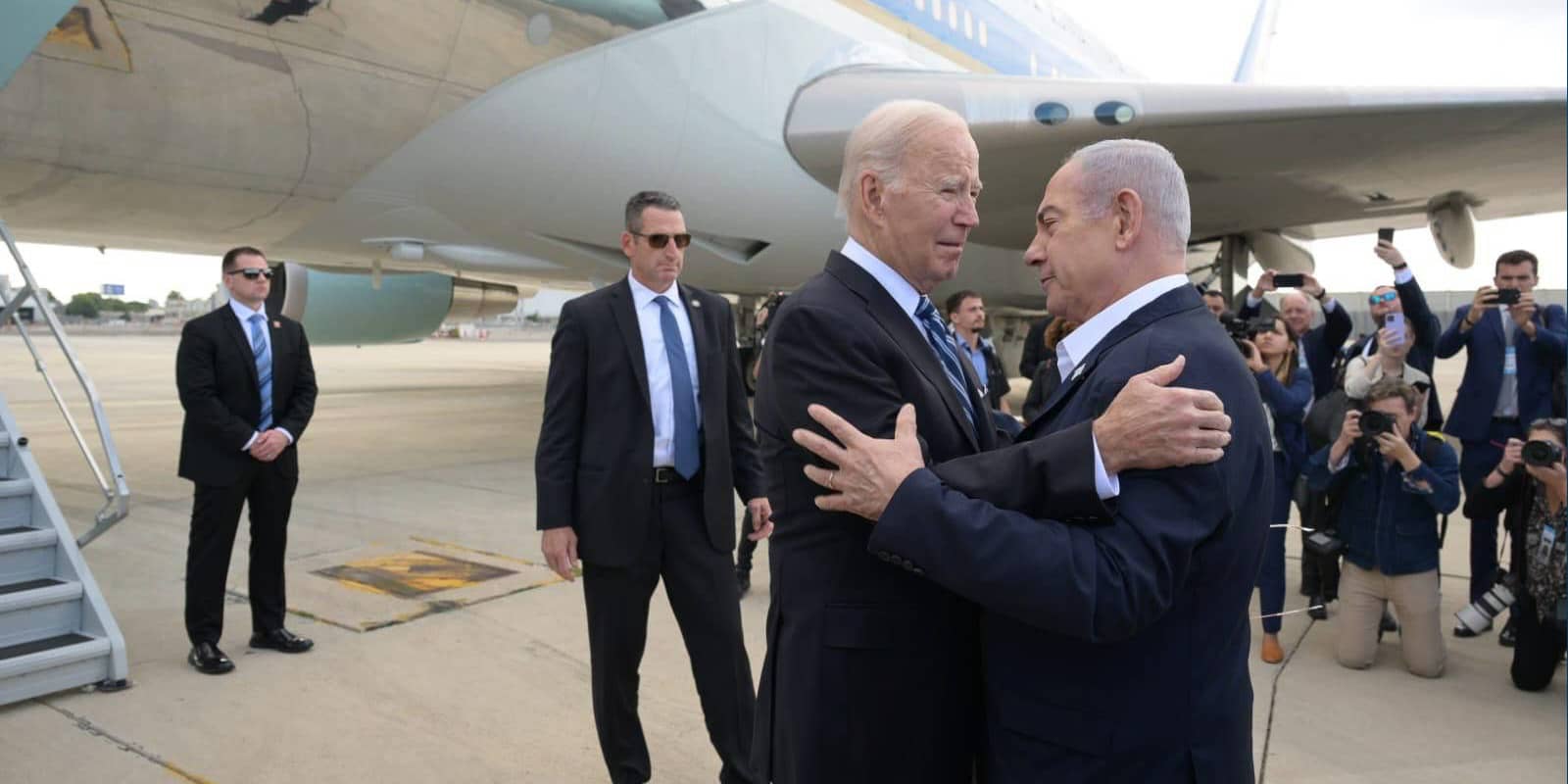Israel should acknowledge and appreciate the historical support from the American people and the U.S. administration and be willing to fulfill certain requests from the U.S. However, Israel must avoid appearing overly reliant on the U.S., as this could strengthen the argument made by its adversaries that it is essentially a U.S. colony. Such a perception would weaken Israel’s regional influence.
United States President Joe Biden made a historic visit to Israel during the ongoing conflict with Hamas, becoming the first American president to do so in such circumstances. His visit underscored the unwavering support the United States has extended to Israel since the terrorist assault launched by Hamas on October 7. President Biden’s visit followed those by the Secretary of State and Secretary of Defense. Secretary of State Anthony Blinken even participated in an hours-long discussion of Israel’s War Cabinet – a move that has attracted some controversy.
The United States reaffirmed its support for Israel by vetoing a proposed United Nations Security Council resolution on October 18 that called for a ceasefire to facilitate the entry of humanitarian aid into the Gaza Strip. This stance was in line with Israel’s right to self-defense and the objective of defeating Hamas in the Gaza Strip. Moreover, American public statements served as warnings to Iran and Hezbollah, cautioning them against taking advantage of the situation to attack Israel.
Simultaneously, the United States deployed two aircraft carriers, fighter jets, and battleships to the eastern Mediterranean region. Additionally, the American government agreed to provide an unprecedented $10 billion in security aid to Israel, equivalent to three years of ongoing American security assistance. This aid package likely includes resources such as Iron Dome interceptors, 155-millimeter shells, and precision-guided bombs. Apart from enhancing defense capabilities, this aid enables Israel to allocate its existing budget to other essential needs.
The remarkable level of support from the American administration towards Israel is far from being self-evident, especially considering the tensions that existed between the two countries over the past year due to disagreements on matters such as the Iranian and Palestinian issues, and legal reforms. The current U.S. policy towards Israel serves to bolster the unofficial alliance between the two nations, signaling to the region and the world that Israel is not standing alone, and it would not be wise to exploit the situation by launching attacks.
Nonetheless, it is important to recognize that this policy aligns with American interests that extend beyond the scope of Israel. In a way, the strong American support for Israel can be seen as a bear hug and a honey trap. Beyond the public messages of support conveyed by the Americans to the international community, their intention is to guide the ongoing conflict between Israel and the Palestinians toward a two-state solution.
The active involvement of the American Secretary of State in the discussions of Israel’s War Cabinet, the most crucial decision-making body in Israel, where pivotal national choices are made, indicates that American engagement is not limited to matters of Israeli foreign relations but also extends to involvement in Israeli domestic policies.
The Biden administration’s support for Israel comes with potential costs. While President Biden supports Israel’s goal of defeating Hamas, he has expressed opposition to a potential Israeli occupation of the Gaza Strip and raised concerns about what will happen once it has defeated Hamas. Additionally, the United States has pressured Israel to allow humanitarian aid to the residents of Gaza (aid that enters from the Egyptian border) contrary to Israel’s demand for reciprocity through steps such as the provision of lists of hostages and access for organizations such as the Red Cross. Opposition to a siege on Gaza obviously strengthens Hamas’ position. The U.S. requested Israel to delay the Israel Defense Forces’ ground incursion into Gaza to gain time to achieve the release of American hostages and improve defense of the American military presence in the region.
Another price the United States may exact pertains to the situation in the north. The New York Times reported on October 21 that President Biden and his advisers urged Israeli leaders to refrain from a preemptive attack on Hezbollah. They are concerned that such an attack could draw Iran into the conflict and spark a wider regional war, potentially drawing in American forces.
In the longer term, the United States could leverage its current bear hug to exert pressure on Israel to make concessions to the Palestinians in Judea and Samaria. The US appears to view the ongoing conflict as an opportunity to advance the realization of a two-state solution for both peoples.
Israel should express its gratitude to the American people and the U.S. administration for their historic and unwavering support. Israel should also be prepared to meet certain requests from the American administration, such as allowing humanitarian aid to enter the southern Gaza Strip, specifically from the Egyptian side, in consideration of the importance of American security assistance. However, Israel must avoid being perceived as a client state of the United States. If Israel is seen as overly dependent on American aid and support, especially during times of conflict, it could reinforce the claims of Israel’s adversaries that it is a de facto American colony and that its existence hinges on American assistance. Such a perception would erode Israel’s regional deterrence.
The regional implications of the war in the Gaza Strip
It can be assumed that as long as the conflict in Gaza persists, U.S. forces in the Middle East will remain vulnerable to attacks by Shiite militias. Such attacks have already commenced, with Hezbollah brigades and Shiite militias in Iraq and Syria targeting American military installations using drones and rockets. These attacks hit American bases such as Al-Harir and Ain al-Assad in Iraq, and the Al-Tanf base and Koniko oil field in Deir ez-Zur, resulting in numerous American soldiers sustaining injuries.
Furthermore, on October 19, the U.S. Navy, in collaboration with Saudi Arabia, intercepted five cruise missiles and a swarm of 15 UAVs launched from Yemen and apparently directed toward Israel. The incident put a spotlight on the regional defense alliance formed by the U.S. Central Command after it assumed responsibility for the U.S. military’s relationship with Israel.
Israel has an opportunity to enhance regional deterrence, especially against Hezbollah, and project a robust presence in the Middle East. Israel could consider participating in joint airstrikes with the United States against the Houthi rebels in Yemen, as well as against Shiite militias in Syria and even Iraq. If the U.S. is uninterested in taking part in these actions, it remains vital that Israel act independently. Additionally, Israel and the United States could cooperate on covert cyberattacks against Iran and Hezbollah to discourage their involvement in hostilities against Israel.
As far as the northern front is concerned, the U.S. has issued deterrent statements against Hezbollah and Iran but has clarified that there will be no American military presence in the conflict zone. This is understandable, as Israel does not require such involvement. However, Israel should work to influence the U.S. administration to activate air defense systems in the region and onboard its aircraft carriers should Hezbollah initiate war against Israel.
Israel should take the lead on a political solution in Gaza
Israel should communicate to the American administration that it will determine the war’s objectives and its management. It must also convey that it will shape the situation in the Gaza Strip following the defeat of Hamas and other terrorist organizations according to its national and security interests.
Furthermore, Israel should assert its commitment to preventing a return to the status quo ante and establish a well-defined post-war policy that it will actively implement.
The most favorable option for Israel would be to occupy and control the Gaza Strip, as it did in the period between the Six-Day War in 1967 and the Oslo Accords in 1993. Transferring control to the Palestinian Authority is likely to result in a resurgence of radical Islamist groups due to the Palestinian Authority’s weaknesses and corruption. The Palestinian Authority lost control of Gaza to Hamas in 2007, and it faces challenges in effectively governing its area of control in Judea and Samaria. Without Israeli security forces, it is likely that the Palestinian Authority’s rule in Area A of Judea and Samaria would have collapsed, allowing Hamas to gain control.
Israel should work with the American administration to establish a new regional framework in cooperation with European countries, Saudi Arabia, and Gulf nations to implement this solution. After defeating Hamas, Israel should create a substantial security buffer zone along the entire length of the Gaza Strip.
To manage the Gaza refugees, Israel should seek the American administration’s support in transferring control and responsibility to another country, such as Egypt. The United States and Saudi Arabia could potentially offer Egypt economic and security incentives to host and rehabilitate Gaza refugees in Sinai or to manage their presence in the southern Gaza Strip.
This strategy will require Israel to engage with the international community diplomatically and to gradually establish facts on the ground to realize parts of the plan that may face opposition from the global community – an approach similar to that it has adopted in Judea and Samaria.
JISS Policy Papers are published through the generosity of the Greg Rosshandler Family.
Photo: IMAGO / ZUMA Wire / Avi Ohayon / Israel GPO








 - בניית אתרים
- בניית אתרים